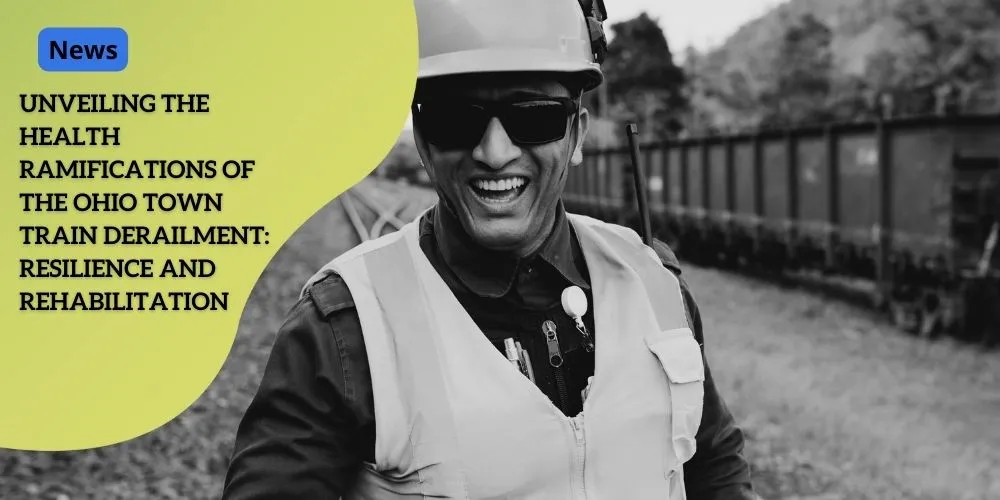Unveiling the Health Ramifications of the Ohio Town Train Derailment: Resilience and Rehabilitation

Anúncios
East Palestine Rebuilds: A Community Grapples with the Aftermath of a Train Derailment
The idyllic town of East Palestine, Ohio, was forever changed on February 3rd, 2023, when a Norfolk Southern freight train carrying hazardous materials derailed. This incident sent shockwaves through the community, raising immediate concerns about resident safety and the long-term environmental impact.
A Cocktail of Chemicals and a Community on Edge
Anúncios
The derailed train cars contained a volatile mix of chemicals, including vinyl chloride, known for its flammability and carcinogenic properties. Ethylene glycol monobutyl ether and butyl acrylate, also present, posed additional health risks through inhalation and skin contact. Emergency responders swiftly evacuated residents within a one-mile radius to prevent potential explosions and toxic gas inhalation. While the immediate threat was contained, anxieties surrounding the long-term consequences festered.
Health Concerns: A Present Danger and an Uncertain Future
Anúncios
The derailment’s initial impact was evident in the immediate health problems reported by residents. Headaches, dizziness, and respiratory distress became a common refrain. However, the specter of long-term health risks loomed large. Fears arose concerning the potential contamination of water supplies and soil by persistent toxins, which could lead to cancers, neurological disorders, and other chronic illnesses down the line.
Beyond physical ailments, the mental and emotional toll of the incident was undeniable. Residents grappled with fear, trauma, and a deep sense of betrayal regarding the safety of their environment. The incident shattered trust in the existing safety protocols and the systems meant to protect them. This emotional upheaval, coupled with economic uncertainty – job security and property values plummeted – cast a long shadow over East Palestine.
A Community Divided: Health Concerns and Displaced Trust
The derailment’s consequences extended beyond the immediate chaos, fracturing the social fabric of East Palestine. Residents experiencing respiratory issues, skin rashes, and persistent headaches felt a growing sense of unease about their well-being. This fear further eroded trust within the community, prompting some residents to relocate. The sense of unity and safety that once defined East Palestine had been fractured.
Living in Uncertainty: Ongoing Health Issues and Unanswered Questions
As the dust settled, the community continued to grapple with ongoing health concerns and unanswered questions. Difficulty breathing, persistent rashes, and the ever-present fear of chronic illness became a daily reality for many. The long-term health impact of exposure to the spilled chemicals remained unclear, adding another layer of emotional strain to a community already under immense pressure.
Responding to the Crisis: Authorities Take Action
In the wake of the disaster, the Environmental Protection Agency (EPA) and Norfolk Southern, the train operator, faced the daunting task of addressing the community’s concerns. The EPA conducted extensive testing to assess environmental safety, but lingering skepticism persisted amongst the residents. Norfolk Southern’s efforts to rebuild trust included funding local infrastructure repairs and establishing a training center, initiatives that received mixed reactions.
Resilience in the Face of Adversity: Rebuilding East Palestine
Despite the significant challenges, East Palestine demonstrated remarkable resilience through various initiatives aimed at recovery. Investments were made to revitalize the local economy and environment, including support for local businesses and health clinics. Additionally, independent medical monitoring programs were established to track the long-term health of residents potentially exposed to the chemicals. However, a pervasive sense of doubt about long-term safety hampered these recovery efforts.
The Road to Recovery: Building a Sustainable Future
As East Palestine continues to navigate the aftermath of the derailment, sustained attention must be paid to the long-term health of the residents and the economic revival of the town. Continued support and decisive action are crucial to rebuilding trust and fostering a strong sense of community spirit. The story of East Palestine is a stark reminder of the potential consequences of hazardous materials transportation accidents. It also serves as a call to action to stand with communities like East Palestine in their journey towards sustainable recovery and long-term resilience.
Looking Forward: Building a More Resilient East Palestine
The East Palestine train derailment serves as a cautionary tale, highlighting the importance of robust safety regulations for hazardous material transportation. It also underscores the need for comprehensive emergency response plans that prioritize resident safety and transparent communication. As East Palestine rebuilds, there’s an opportunity to create a more resilient community. Investments in environmental remediation, healthcare infrastructure, and economic development can lay the foundation for a sustainable future. Moreover, fostering a culture of environmental awareness and community preparedness can empower residents to play a proactive role in safeguarding their well-being. The road to recovery for East Palestine will undoubtedly be long and arduous. However, by working together, the community can emerge from this crisis stronger and more united.






